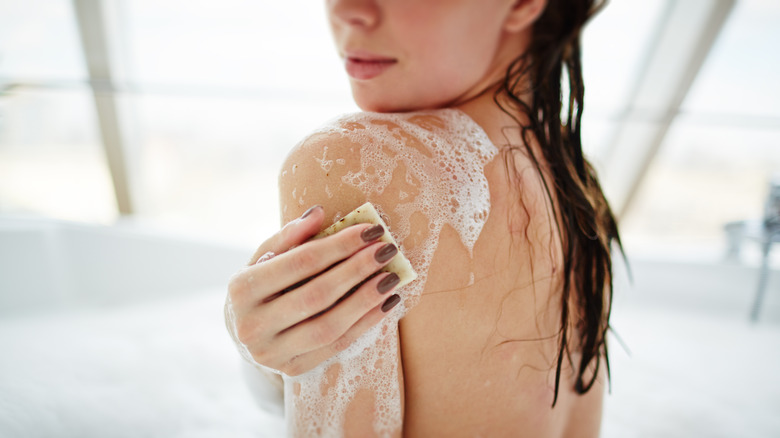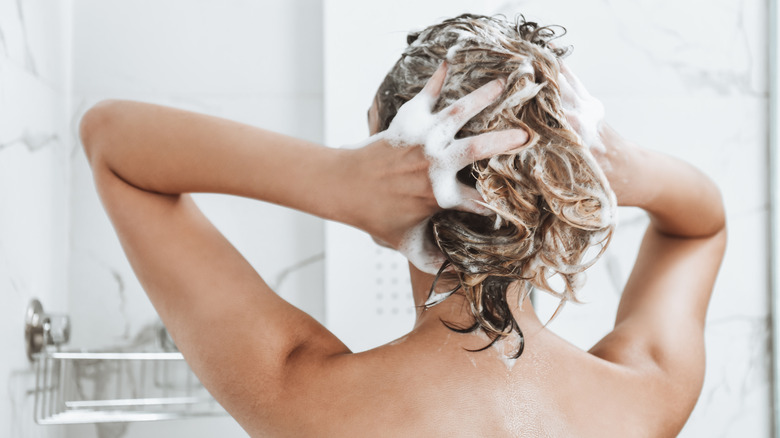Is It Safe To Use Shampoo On Your Skin When You Run Out Of Body Wash? What We Know
If you've ever found yourself in the unfortunate situation of running out of body wash on a hectic day, you know how frustrating it can be. With no time to dash to the store, you're left with a single option: shampoo. After all, if it foams, it must cleanse, right? Well, not quite. Dish soap foams too, but you definitely don't want that on your skin as substituting with it can lead to skin irritation and dryness.
So, what about shampoo? Since both products are designed for human use, is it safe to use shampoo when you're out of body wash? To provide an accurate answer, we need to consider the ingredients found in shampoo. While different brands have unique formulations, most shampoos have a common set of ingredients. Let's take a closer look at these ingredients and evaluate whether they can cause any harm when applied to the skin.
What is shampoo made of and is it safe for the skin?
Shampoos are complex formulations composed of various ingredients, mostly surfactants. "Cosmetic Science and Technology: Theoretical Principles and Applications" explains that up to 20% of shampoo is made of surfactants, which create foam. However, shampoos typically contain stronger and more concentrated surfactants than body washes. This means that shampoo on the skin can disrupt the skin's natural protective barrier, leading to itchiness, skin reactions, sensitivity, and dryness. Yikes.
In contrast, body washes are formulated with ingredients like glycerin, which help moisturize the skin, compensating for what the surfactants wash away. Shampoos, on the other hand, are not designed to moisturize the body. But what if you moisturize your skin afterward? Well, this does not address the pH problem. Shampoos typically have a lower, more acidic pH than body washes, and disrupting your skin's pH balance can result in irritation and may even alter the skin's microbiome.
Furthermore, shampoos often contain fragrances intended to keep the hair smelling fresh. This is a red flag as fragrance is a skincare ingredient to avoid if you have sensitive skin. Even other skin types may react to shampoo fragrance as it is not formulated for the skin. Additionally, shampoos may include additives specifically designed for hair care that offer no benefit to the skin.
Can using shampoo on your skin have long-term negative effects?
So, we've established that shampoo isn't an ideal choice for your skin. But what happens if it's your only option and you really need a bath? Well, sometimes you have to make do with what you have. The good news is that using shampoo on your skin as a one-time solution is unlikely to cause long-term damage unless your skin is particularly sensitive to any ingredients.
If you don't have sensitive skin, you probably don't have to worry about this — except if you're using a product with any of the shampoo and conditioner ingredients that cause the most hair damage. In this case, you'll damage both your hair and skin in a single sweep. However, if you continue denying your skin the nutrients it needs by using shampoo instead of body wash, you could contribute to your skin's premature aging.
Now, what about using body wash as a shampoo? Well, if you care about the health of your hair, you shouldn't do it, particularly since a hair wash can usually be delayed if necessary. Hair washes are formulated with specific ingredients that promote hair growth and protect it from damage. A body wash, on the other hand, is not designed to provide these benefits and will do a poor job of cleansing your hair while offering zero protection. It's a perfect hair-loss recipe; don't do it, folks.


